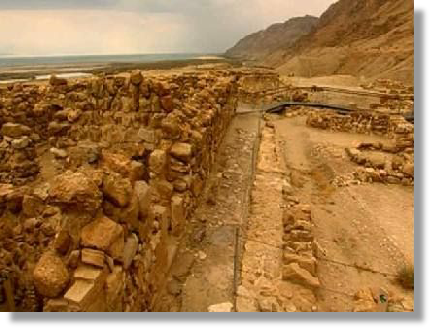









Station Road, Knowle, Solihull, West Midlands B93 0HN




God was about to take on Satan
The Dead Sea scrolls allow us to do precisely that because they were written at the time of Jesus. They reveal that the Jews expected a particular kind of war to commence, a battle between good and evil. They believed that it would be fought in a specific way and imminently.
The authors of the scrolls were a group called the Essenes, who lived and worked here miles away from civilisation and they'd withdrawn from society for a very good reason. Like all Jews in Israel, they'd lived through centuries of oppression, culminating with the brutal rule of the Romans who dealt with any opposition ruthlessly. But for the Essenes, the Romans weren't just a foreign occupying force they were Satan's representatives on earth.
The fact that the Romans were here meant that evil had taken root in their land. So it's not that surprising that the Essenes decided to flee the cities where Roman power was based and instead settled in this wilderness.
But the scrolls reveal that they were living in hope. They believed that the forces of evil would be overcome. That meant that both the Romans, Satan's representatives on earth, as well as his supernatural powers. And they were convinced that there was only one authority strong enough to take on evil. God. The most powerful force for good in the universe.
So, by taking on not just one demon at the exorcism at Gergasa but many, and banishing them to the sea, was Jesus suggesting that he was God? At first glance it seems unlikely. After all, Jesus wasn't the only exorcist in first century Galilee.
Just twelve miles from Nazareth is the resting place of another charismatic preacher and contemporary of Jesus. His name was Hanina Ben Dosa, and for 2000 years his tomb has been a Jewish shrine. That's because Hanina, just like Jesus, had a reputation as a healer and an exorcist. Jewish historians of the time make it clear that exorcists were common throughout the Roman world. Proof that Jesus certainly wasn't unique in casting out demons.
But what if the exorcism was part of a wider pattern? What if this wasn't the only time Jesus acted in a way that God was supposed to act? There's one particular miracle which suggests that Jesus' actions at Gergasa weren't the only time he had claimed such extraordinary authority.
As Jesus' mission continued, his reputation for incredible healings and exorcisms meant that wherever he went crowds flocked. They came to hear him teach, but also to ask for his help in the hope that he would be able to heal their loved ones.
God was about to take on Satan


Miracles of Jesus
Part 2 Signs of Divinity? 6
